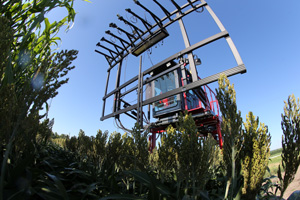IoT Tech to Increase Food Production in Purdue Digital Agriculture Program

IoT sensors measure variations of crop performance and transmit real-time data over a wireless network.
Purdue University researchers are tapping into the Internet of Things to study and improve plant growth and food production processes. The institution's College of Agriculture is using a variety of sensors, cameras and human inputs in conjunction with Aruba WiFi and HPE Edgeline solutions for a new, data-driven digital agriculture program that "aims to grow and produce food and fuel more effectively than ever before," according to a news announcement.
The program captures terabytes of data from the university's 1,408-acre Agronomy Center for Research and Education (ACRE) field research station, then transmits it back for processing by a Purdue supercomputer. Connectivity along the way is provided by the Aruba wireless network infrastructure. The tech setup has allowed researchers to replace previously manual processes and boost productivity and accuracy, according to the announcement. In seed research, for example, "researchers using mobile devices in the field can quickly transmit information about seed growth back to central labs [and] analyze the impact of water levels, fertilizer quantities and soil types covering the seeds. In turn, the labs can communicate their analysis and feed this information back to the field to quickly make adjustments."
Some of the technology innovations currently in use at the research facility include:
- Solar-powered mobile WiFi hotspots, which allow researchers to enter data in the field via mobile device and send it to Purdue's data center for analysis;
- An adaptive weather tower, providing high-speed connectivity across the ACRE facility to plant-attached sensors for measuring crop growth; and
- PhenoRover, a semi-automated vehicle that provides an IoT sensor platform to measure variations in crop performance.
Purdue is also experimenting with the use of drones for data collection, and looking into marketing its digital agriculture technologies for commercial use.
"Our digital agriculture project is the natural extension of a 5-plus-year strategic relationship between Purdue University and HPE," said Karen Plaut, interim dean of Purdue's College of Agriculture, in a statement. "As Purdue's strategic digital agriculture partner, Aruba and HPE provide not only critical infrastructure, but on-site IT support and partnering in student research and internship programs. Together, we can innovate and drive new efficiencies that have a significant impact on global food production."
About the Author
Rhea Kelly is editor in chief for Campus Technology, THE Journal, and Spaces4Learning. She can be reached at [email protected].